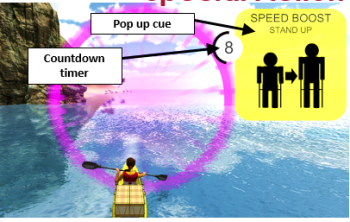Strength And BALance (SABAL) Virtual Trainer Pilot Study Demonstrates Validity of Game-Derived Metrics
The Strength And BALance (SABAL) software system provides a virtual world-based gaming experience incorporating evidence-based exercise that aims to reduce the risk of falling in older adults. A prototype game was developed under a small business research grant from the National Institutes on Aging (1R41AG046958-01A1) including an integrated virtual world in which the older adult player takes on the role of a player-hero in two quests. Game play involves physical actions incorporating evidences-based strength and balance exercises.
In a completed pilot study conducted between August and November 2016, 21 older adults (ages ranging from 70 to 90) used this SABAL prototype system during three visits each to an exercise and sports injury laboratory. The primary investigational hypothesis for the pilot study was that a SABAL measure (“SABAL score”), derived using the system’s Kinect-based full body motion capture capability, would be correlated to gold-standard clinical measures of fall risk, including the Berg Balance Scale (BBS). Analysis of the pilot study results showed that the correlation between SABAL score and BBS, estimated using the Pearson Product-Moment (PM) correlation coefficient is r=0.80 (95% confidence interval (CI): [0.59, 0.92], p<0.001). Similar statistically significant correlations results were found for other gold standard measures. The primary investigational hypothesis is thus confirmed, establishing the concurrent validity of SABAL game-derived measures of functional balance. A follow-on effort will investigate the efficacy of a SABAL-based program for improving balance in older adults.

